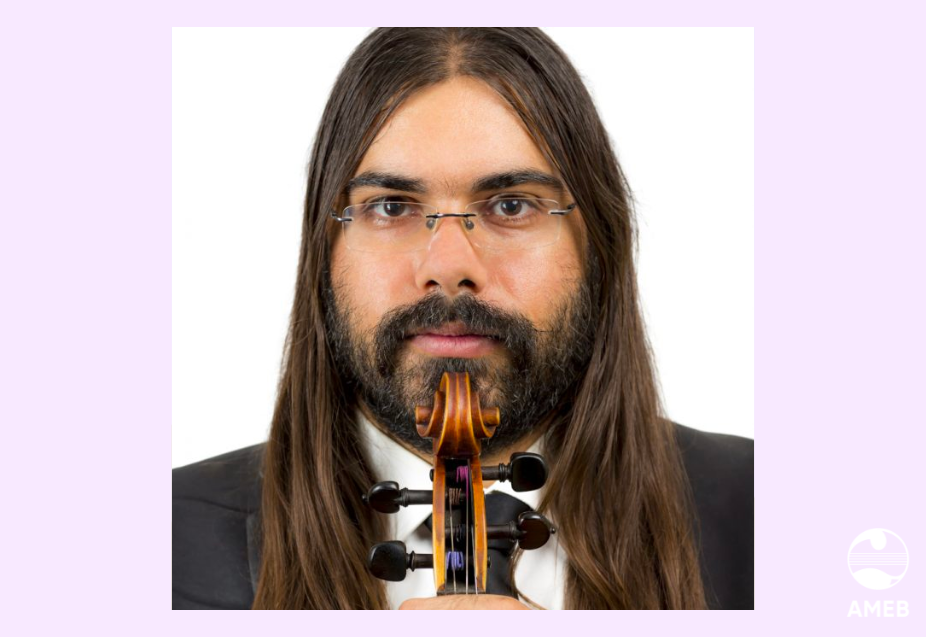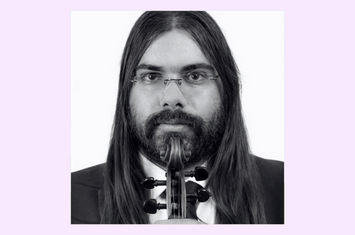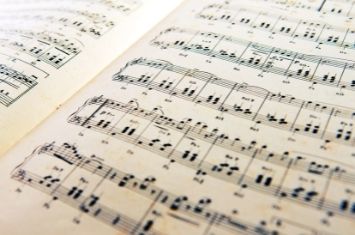
Aaron Wyatt is a Noongar man, viola player, composer and conductor situated in Naarm (Melbourne), originally from Boorloo (Perth), Western Australia. In addition to the long-standing relationships with many ensembles and orchestras, including the West Australian Symphony Orchestra, Allegri Chamber Orchestra, South Side Symphony and more, Wyatt's work and innovation in technology share a foundation of music. While also interested in conducting, Wyatt lectures at The Sir Zelman Cowen School of Music at Monash University, whose PhD research focuses on animated graphic score notation. He has developed the iPad's Decibel ScorePlayer app, which allows for the network-synchronised playback of such scores.
Key themes: interpretation, connection, expression, youth orchestra, community, music, technology, conducting, ensemble work, leadership
Let's go back to when you were a kid playing around on the piano and how you eventually picked up the violin.
A family friend had a piano, and I was intrigued by the instrument. I enjoyed mucking around on it but did not understand music theory at that stage. Seeing my interest in music, my parents decided to enrol me in a music appreciation class, basic musicianship and aural skills, dressed up as games to engage with kids. I did well at it, and they suggested I take the next step and learn an instrument. My parents were worried that the piano would be too big for me (in terms of reaching the keys), and violins came in small sizes, so they decided that would be the way to go.
You have a broad spectrum of interests across music and technology. Has music always been your primary interest?
Music played a part in everything. In terms of my interests as a kid, I went through a whole bunch of phases. Most kids do.
I started with things like palaeontology and then; chemistry, astronomy, geology, and all sorts of exciting things, until, eventually, I settled on doing biomedical science and electronic engineering at uni. And then, after I did that for a year and switched to music. Music has been part of my broad range of interests for a long time, never at the forefront, but it was always something constant.
I spent a lot of years growing up through the youth orchestra system. I started with the junior string orchestras, then gradually worked my way up as I got older and better, playing in the secondary symphony orchestra and then the main symphony orchestra. Youth orchestra was as much a social thing as a musical thing. There were people I grew up with through the youth orchestra and have remained friends with still. Some of them are professional musicians as well. It was cool having that social connection as much as the musical thing growing up. So, yes, music has always been there for me.
What was it like in Youth Orchestra and being around people with similar interests or passions?
It was great to have like-minded people around you and meet other kids with similar passions and interests outside the standard high-school peer groups.
You explain conducting as the idea of interpretation, connection and expression, and for many people conducting is a mystery. Where did conducting begin for you?
I got into conducting through uni. It was an elective as part of the performance units, and I enjoyed it. It's hard to pin a major moment conducting something significant for the first time because it was a gradual series of bigger and better things.
Starting with a very small community orchestra that needed a conductor, then working up to school ensembles, school musicals and a much bigger community orchestra (Southside Symphony Orchestra), where I was musical director for about five years.
The first major professional(-ish) thing I did would have been the WASO young conductor showcase (rehearsal setting, conducting the symphony orchestra and being up in front) of an ensemble I'd been a very casual member of for a long time. That was an amazing experience.
I also conducted a community event every summer, the Quaranup music camp in Albany [WA]. There I conducted some incredible major repertoire in very relaxed situations. From there, my first major performance was in Cat Hope's Speechless at the 2019 Perth International Arts Festival. More recently, my first time conducting a state orchestra in concert was with the Melbourne Symphony Orchestra, doing the two-and-a-half to three-minute Acknowledgement of Country piece, Long time living here by Deborah Cheetham AO. Not to diminish the significance of that work, but comparatively, I have conducted small works with major orchestras and major works in smaller or more casual ensembles.
In saying that, I always get something from every situation, personally and in terms of what I can give the ensemble.
Going back to the performance of Long time living here by Deborah Cheetham AO, did you have to approach this work differently as a First Nations conductor taking on the work of a First Nations composer?
To be honest, no. I approached the work the same way I approached any work, even though it was a shorter piece.
People expect a very poetic response to that question, but the reality of it (for a conductor) is just standing there, thinking about what you need to do, what you need to give the musicians, and how you will get through it. Not stuffing up and making sure it went well and all those dull technical things rather than anything poetic. The rest, what it meant to people or represented, came to me after the performance as an afterthought.
What are the critical elements of conducting that people would never consider? What does the conductor do to get an ensemble or music to where it needs to be?
First, you must come with a thorough understanding of the score and knowledge of precisely what you want out of it. If you don't, there's no way you can communicate with the players, be ultra-prepared.
Get to know the ensemble. The more experience you have with an ensemble as a conductor, the easier it is to recognise what you can and can't fix and the ensemble's limitations.
Taking a community orchestra for five years gave me a good appreciation for what they're capable of, the repertoire that will work for them, and how to push and challenge them while still being attainable and not demoralising.
A large part of conducting is knowing what the musicians need from you and when to get out of the way and let them do their thing. A big part is also serving the music. Many conductors let their egos get in the way, but it shouldn't be about you. It should just be the experience of making music together with you.
I'm the one person in an ensemble who's not making any sound whatsoever, yet, I'm also contributing to the landscape of sound being made. Ensembles and orchestras can work without a conductor. Having that awareness and humility leads to good leadership in any sense of the musical world and other spaces, knowing that it's not all about you. Conducting is about getting the most out of the people doing the real work.
You've worked with Deborah Cheetham AO as a founding member and Artistic Director of Ensemble Dutala with Short Black Opera and the One Day in January project.
Yes, Deborah is a powerhouse. I don't know where she gets all the energy at times. I first met Deborah only a short time after coming to Melbourne. She was someone I'd meant to contact because I didn't know any other indigenous people in the classical music space at that level.
A friend of mine had been listening to classic FM and had heard an interview with Deborah, where she called out indigenous classical musicians, and that's how I joined the One Day in January project.
Initially, it was a small group at first, but it's growing year by year. We've had a couple of scholarship recipients, one of whom is studying at a tertiary level at Monash University. He is a cellist with the potential to enter the profession if he puts in the practice and the work. It's exciting.
In early 2022, we had the first piece I wrote in conjunction with workshops with the Ensemble Dulata, purely for the instruments and featuring members of Dulata. It was an art installation piece designed as a live performance and a 20-minute looping audio-visual installation at the Monash University Museum of Art in Caulfield (VIC).
Was that a part of your PhD and that app you made?
Yes, that was using the app. The work was a very drone-like soundscape, which is something some of the players in Ensemble Dulata had yet to come across much before. I've always worked with groups who are open to exploring things. And so, it didn't feel any different in that sense. It was an electroacoustic work with a soundscape underneath, built from all these sounds taken from videos contributed by ensemble members of places that are special to them and where they find themselves now. During the performance, there were five screens in the installation, three on one side of the wall and two on the other in a staggered formation.
Filmed in Iwaki Auditorium (VIC), it was a straightforward sort of moving portrait. Musicians would fade in and out of the screen with the original footage from when the ensemble members had recorded their landscape sounds on a loop.
I actively explored the themes of connection and place. In some way, indigenous themes, though so much of my work focuses on music, just music. Being able to do both shatters the idea of pigeonholing all Indigenous-made work as "Indigenous-themed" and not allowing us to make other work that departs from that and evokes or pushes the modern world and sound. And this is part of our shared existence. It's nice not just to have a singular focus, and it's the same with conducting.


